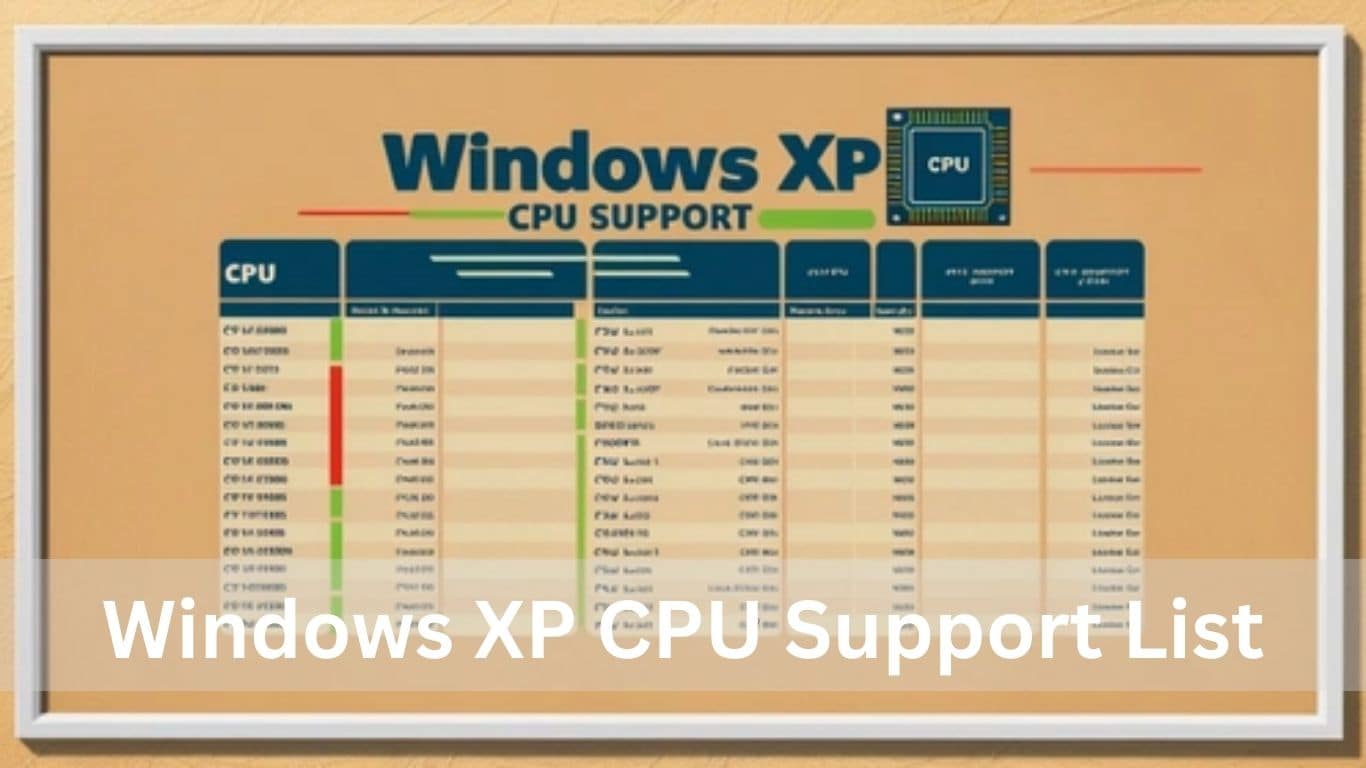Ah, Windows XP. It’s like that old comfy sweater you just can’t part with. Released in 2001, it quickly became one of Microsoft’s most loved operating systems, praised for its easy-to-use interface and dependable performance.
Windows XP CPU Support List (short answer)
The Windows XP CPU Support List shows compatible processors for the best performance on Windows XP. It includes Intel CPUs that work smoothly with the system’s architecture, ensuring reliable and efficient operation.
In this article, we will discuss the Windows XP CPU Support List.
Introduction to Windows XP CPU Support List

1. Architecture Compatibility
Windows XP works with two CPU types: x86 (32-bit) and x64 (64-bit). The 32-bit version was the most common, but the 64-bit version improved performance and allowed more memory handling for better speed and efficiency.
2. Maximum supported processor speed
Windows XP can run on processors as slow as 233 MHz, but it works better with faster ones. For the best performance, it’s recommended to use a processor with a speed of at least 300 MHz or higher.
3. Socket Types
- Socket 370: Works with Intel Pentium III and Celeron processors.
- Socket 478: supports Intel Pentium 4 and Celeron processors.
- Socket A (462): For AMD Athlon and Duron processors.
- Socket 754: Compatible with AMD Athlon 64 and Sempron processors.
- Socket 939 supports AMD Athlon 64, Athlon 64 X2, and Opteron processors, offering compatibility with a range of CPUs for enhanced system performance.
4. Impact of CPUs on System Performance
The CPU is like the brain of the computer, and it greatly affects how well the system works. Faster, multi-core processors improve multitasking and system speed, especially important for users who need to run many applications at the same time.
Exploring More Aspects of the Windows XP CPU Support List

1. Hyper-Threading Technology
Intel’s Hyper-Threading Technology, found in many Pentium 4 processors, is supported by Windows XP. It enables a single processor to manage multiple tasks (threads) at once, boosting efficiency and improving multitasking performance on the system.
2. Virtualisation Support
Windows XP doesn’t have built-in support for hardware virtualisation, but many CPUs compatible with XP do support it. This feature is important for running virtual machines and handling advanced computing tasks efficiently.
3. Overclocking Potential
Many processors that work with Windows XP can be overclocked, meaning users can increase their speed beyond the default settings. This can boost performance but needs careful management to prevent overheating and potential damage to the hardware.
4. Legacy Support and Compatibility
Windows XP supports many older CPUs, making it compatible with a wide range of legacy hardware. It’s well-known for running older software and games that might not work properly on newer operating systems, offering better support for retro systems.
Read Also: Inventory Agent High CPU – Unveiling the Truth!
Evolution of Windows XP CPU Support
Windows XP started with support for basic single-core processors and later expanded to include more advanced multi-core CPUs. Over time, updates enabled XP to handle faster and more powerful processors, enhancing performance and staying relevant with evolving technology.
How Does The CPU Support List Impact Performance?

The CPU support list ensures Windows XP runs efficiently by identifying which processors work best with the system. A compatible CPU boosts performance and speed, while using an unsupported one can lead to slowdowns or system crashes.
What Is The Windows XP CPU Support List?
The Windows XP CPU support list shows all processors that work with the operating system. It helps users select a CPU that guarantees smooth performance and system stability.
How To Check CPU Compatibility?
To check if your CPU is compatible with Windows XP, consult the official CPU support list or use software tools to identify your processor and compare it with the list.
Challenges With Unsupported Cpus
- System Instability: Using unsupported CPUs can lead to crashes and errors, making your computer unreliable and hard to use.
- Performance Issues: These CPUs may not be optimised for Windows XP, resulting in slower speeds and reduced performance.
- Driver Incompatibility: Unsupported CPUs often lack compatible drivers, causing problems with hardware and peripherals.
- Security Vulnerabilities: An unsupported CPU may expose your system to security risks due to a lack of updates and patches, making it more vulnerable to malware.
- Software Compatibility: Many modern applications may need to be fixed on unsupported CPUs, limiting your system’s functionality.
Windows XP CPU Support List: Impact on Software Compatibility
The CPU support list is crucial in determining software compatibility with Windows XP. A compatible CPU helps ensure that most programs run smoothly, while an unsupported CPU can lead to slow performance or prevent software from working entirely.
Guidance for Windows XP Users
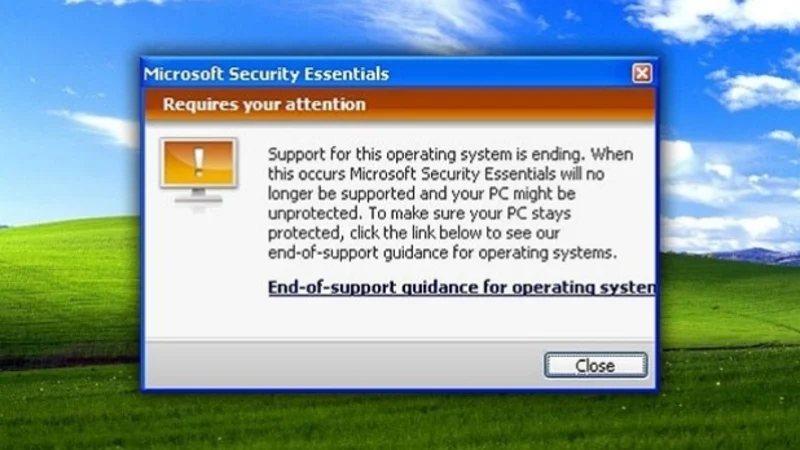
Windows XP users should select a compatible CPU for optimal performance. Check that your processor is on the support list to prevent issues. Regularly update drivers and consider using older, reliable hardware to ensure system stability and reliability.
Which CPU is Best for Windows XP?
The ideal CPUs for Windows XP are from Intel’s Pentium 4 or AMD’s Athlon XP series. These processors are fully compatible and offer reliable performance and stability, avoiding problems that may arise with newer, unsupported CPUs.
What Is the Best CPU for a Windows XP Device?
For a Windows XP device, the best CPUs to consider are Intel’s Pentium 4 and AMD’s Athlon XP. These processors offer good compatibility, stability, and decent performance, making them ideal for running Windows XP efficiently and smoothly.
Read Also: CPU Machine Check Architecture Error Dump – Fixed 100% in 2024
What Is the Best Specs To Use For A Windows XP Build?
For a strong Windows XP build, here are the recommended specs:
- CPU: Intel Core 2 Duo or AMD Athlon 64 X2
- RAM: 2 GB (maximum for 32-bit XP)
- Storage: 120 GB SSD for quick booting and loading
- Graphics: Compatible options include the NVIDIA GeForce 6000 series or the ATI Radeon 9000 series, providing solid performance for older systems.
These components will provide good performance and stability for Windows XP.
Hypothetical XP Build With The Best, Officially Compatible Parts
For a high-performance Windows XP build using the best officially compatible parts, consider the following:
- CPU: Intel Core 2 Quad Q9650
- RAM: 4 GB (32-bit XP uses about 3.5 GB).
- Storage: 240 GB SSD for fast loading and system responsiveness
- Graphics: NVIDIA GeForce GTX 260 for solid gaming and graphics tasks
- Motherboard:Asus P5Q Deluxe for reliable compatibility and expansion options
This setup balances power and compatibility, offering the best performance for Windows XP.
Most Modern CPU for Windows XP 32 Bit?
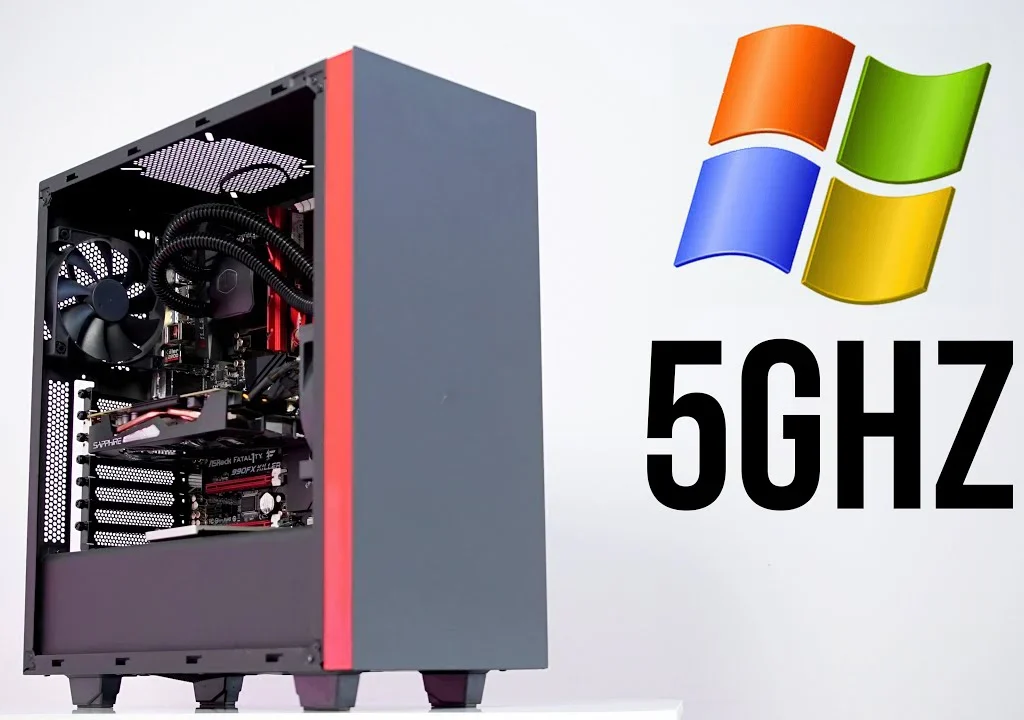
The most modern CPUs fully compatible with Windows XP 32-bit systems are Intel’s Core 2 Duo and Core 2 Quad series, along with AMD’s Athlon 64 X2 processors. These offer more performance and stability than older Pentium 4 and Athlon XP CPUs while maintaining compatibility with the OS.
Most powerful configuration with hardware still supported by Windows XP
For the most powerful hardware configuration still supported by Windows XP, use this setup:
- CPU: Intel Core 2 Quad or AMD Athlon 64 X2 for top performance
- RAM: 4 GB (XP 32-bit supports around 3.5 GB)
- Storage: 240 GB SSD for faster system speed
- Graphics: NVIDIA GeForce GTX 260 or ATI Radeon HD 4870 for smooth visuals
This setup maximises performance while staying fully compatible with Windows XP.
What Is The Latest Hardware That Still Has Windows XP Support?
The latest hardware that still supports Windows XP includes Intel Core 2 Duo, Core 2 Quad processors, and AMD Athlon 64 X2 models. These CPUs are the most modern options compatible with Windows XP, providing stable performance for older applications.
What Is The Newest Model Computer That I Can Install Windows XP On?
The newest computers that can still run Windows XP are typically from around 2010 or earlier. Models with Intel Core 2 Duo, Core 2 Quad, or AMD Athlon 64 X2 processors are ideal, as they offer the latest hardware compatible with Windows XP.
Read Also: CPU Vdd Soc Current Optimization – Comprehensive Guide 2024
What’s the Oldest Computer That Can Run Windows XP?
The oldest computers that can run Windows XP effectively date back to the early 2000s. These include systems with Intel Pentium III or AMD Athlon processors, provided they have at least 128 MB of RAM and other compatible hardware components.
What Are The Hardware Requirements Of Windows XP?
Windows XP requires a 233 MHz processor, 64 MB of RAM, and 1.5 GB of hard drive space at minimum. For better performance, a 300 MHz processor, 128 MB of RAM, and the same storage are recommended.
Newest Possible Systems For Windows XP and Windows 7
The latest systems that can run both Windows XP and Windows 7 feature Intel Core 2 Duo and Core 2 Quad processors and some AMD Athlon 64 X2 models. These configurations effectively support older versions of Windows.
Windows XP Support on 4th Gen Intel Core
Windows XP can work with certain 4th Gen Intel Core processors, including Core i3, i5, and i7 models. However, compatibility largely depends on the specific motherboard and chipset used, so it’s important to check those details before installation.
List of Intel Processors That Support Xpmode
Here’s a list of Intel processors that support XP Mode in Windows 7:
Core 2 Series:
- Core 2 Duo: E4300, E4400, E6600, E6700, E8000 series
- Core 2 Quad: Q6600, Q6700, Q8200, Q8300, Q9400, Q9650
Core i Series:
- Core i3: i3-2100, i3-2120, i3-3220
- Core i5: i5-2400, i5-2500, i5-3570
- Core i7: i7-2600, i7-2700K, i7-3770
These processors are capable of providing seamless virtualisation for running Windows XP in Windows 7.
Windows XP Hardware Compatibility List
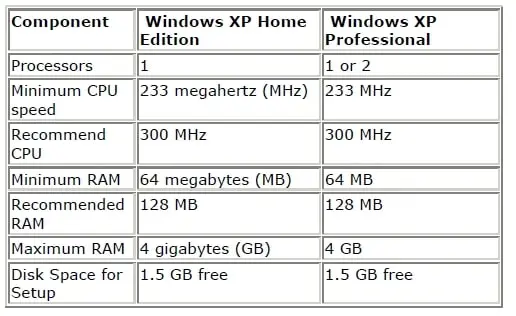
Windows XP is compatible with various hardware components, including processors like the Intel Pentium 4, Core 2 Duo, and AMD Athlon XP. To ensure optimal performance, motherboards must support these CPUs, and graphics cards and network adapters should also be compatible.
Last Motherboard To Support Windows XP
The last motherboards are compatible with Windows XP feature models from the Intel 9 Series and AMD 900 Series chipsets. These motherboards allow users to utilise older hardware and drivers crucial for running Windows XP effectively.
What CPU Does Windows XP Support?
Windows XP supports CPUs such as the Intel Pentium 4, Core 2 Duo, and AMD Athlon XP processors. These CPUs offer sufficient performance for running the operating system and compatible applications smoothly.
What Is the Fastest CPU for XP?
The fastest CPUs for Windows XP are the Intel Core 2 Duo E8600, Core 2 Quad Q9650, and AMD Athlon 64 X2 6000+. These processors provide improved speed and efficiency, making them ideal for running older applications and games effectively.
What Is The Last Chipset To Support Windows XP?
The last chipsets that support Windows XP are Intel’s 9 Series and AMD’s 900 Series. These chipsets ensure compatibility and provide the necessary drivers for running Windows XP on more modern motherboards.
What Is The Maximum CPU Limit For Windows XP?
Windows XP’s maximum CPU limit includes processors like the Intel Core 2 Quad Q9650 and AMD Athlon 64 X2 6400+. These CPUs provide strong performance for running older applications and performing various tasks efficiently.
What Is Max CPU for Windows XP With Full Support No Patches?
The highest CPUs fully supported by Windows XP without needing patches are the Intel Core 2 Quad Q9650 and the AMD Athlon 64 X2 6400+. These processors deliver optimal performance for running older applications effectively.
XP Compatible Motherboard List?
Motherboards that work well with Windows XP include Intel’s 9 Series and AMD’s 900 Series chipsets. These motherboards support older hardware and ensure smooth operation with the XP operating system.
Dual-Core or Quad-Core CPU for Windows XP and for the Games? And How Much Ram?
For Windows XP gaming, a dual-core CPU like the Intel Core 2 Duo or AMD Athlon 64 X2, paired with 2-4 GB of RAM, provides solid performance. This setup supports smooth multitasking and offers good gameplay for older titles.
Windows XP and Quad Core Processors
Windows XP supports quad-core processors like the Intel Core 2 Quad series and AMD Phenom II X4. These CPUs improve multitasking and performance, making them suitable for running older software and games on the operating system.
Does Windows XP support Intel Pentium Iii processors?
Yes, Windows XP supports Intel Pentium III processors, but for better performance and compatibility with more recent software, upgrading to a newer CPU is advisable.
Latest Windows XP Compatible Hardware (Read Rule)
The latest hardware compatible with Windows XP includes Intel Core 2 Duo, Core 2 Quad processors, and select AMD Athlon 64 X2 models. These components ensure seamless performance while meeting XP’s legacy hardware requirements.
Last CPU To Support XP
The last CPUs to fully support Windows XP are the Intel Core 2 Quad Q9650 and AMD Athlon 64 X2 6400+. They offer solid performance and compatibility for running Windows’s software and applications efficiently.
Most Powerful Windows XP Computer

For the most powerful Windows XP computer, pairing an Intel Core 2 Extreme QX9770 with 8 GB of RAM and a high-end NVIDIA GTX 9800 graphics card can deliver top-tier performance, especially for gaming and demanding applications.
Windows XP Max CPU Cores
Windows XP can utilise up to quad-core CPUs, including the Intel Core 2 Quad series and AMD Phenom II X4. These processors enhance multitasking capabilities and improve performance for older applications and games, making them suitable for XP users.
Windows XP 4th Gen Intel
Windows XP can work with certain 4th Gen Intel Core processors, such as Core i3, i5, and i7. However, compatibility varies based on the motherboard and chipset, so it’s essential to check for support to ensure optimal performance.
Is There Any Possible CPU That Supports Windows 1 All The Way To At Least Windows XP?
No, there isn’t a single CPU that supports all versions of Windows from Windows 1 to at least Windows XP. Each Windows version has different requirements, and newer CPUs typically lack the necessary features for older systems like Windows 1.
Best CPU for Windows XP
The top CPUs for Windows XP are Intel’s Pentium 4 or AMD’s Athlon XP series, offering reliable performance for the operating system. These processors provide reliable performance and stability, making them ideal for basic tasks and older software, including games that don’t require much power.
Last CPU to Support Windows 7
The last CPUs to support Windows 7 are Intel’s 6th-generation Core i7 processors, such as the i7-6700, and AMD’s FX series. These processors can run Windows 7 effectively but might require compatibility updates or drivers.
Latest Motherboard To Support Windows XP
The latest motherboards compatible with Windows XP feature Intel’s 9 Series chipsets and AMD’s 900 Series chipsets. These boards support older components and drivers, ensuring that Windows XP operates effectively on newer hardware.
How Many Cores Does Windows XP Support?
Windows XP supports up to four CPU cores, such as the Intel Core 2 Quad and AMD Phenom II X4. This configuration enhances performance for multitasking, but the OS does not fully utilise processors with more than four cores.
Broadwell Windows XP
Windows XP can run on certain Broadwell CPUs (Intel’s 5th generation), but it may require specific drivers and compatibility adjustments. Since Broadwell processors are more advanced, some features might not function optimally due to the limitations of XP.
Core 2 Duo Windows XP
Windows XP performs effectively with Intel Core 2 Duo processors. These dual-core CPUs offer:
- Sufficient power for handling most XP tasks.
- Enhanced speed and multitasking capabilities compared to older single-core processors.
- A popular option for building reliable XP systems.
Windows XP Help Me Pick A CPU
For Windows XP, consider these CPUs:
- Intel Pentium 4: Good for basic tasks.
- Intel Core 2 Duo: offers better speed and multitasking.
- AMD Athlon XP: A solid choice for compatibility.
Pick based on your needs, whether for everyday tasks or light gaming.
Fastest Windows XP System
The fastest Windows XP system features Intel Core 2 Quad or AMD Phenom II X4 processors, paired with 4 GB of RAM and a fast SSD. This combination enhances performance, providing smooth multitasking and rapid system operations.
Are My Parts Compatible For A XP System?
Yes, To check if your parts are compatible with Windows XP, confirm that your CPU, motherboard, and graphics card are on the supported list. Look for older components like Intel Core 2 Duo processors and chipsets that support XP drivers and software.
Newest Supporting Motherboard + CPU
The newest motherboards and CPUs that support Windows XP include Intel Core 2 Duo and AMD Phenom II processors, paired with compatible chipsets. These options ensure that drivers are available for a stable and effective Windows XP experience.
Windows Won’t Boot After CPU Upgrade Unless Two Cores Are Disabled
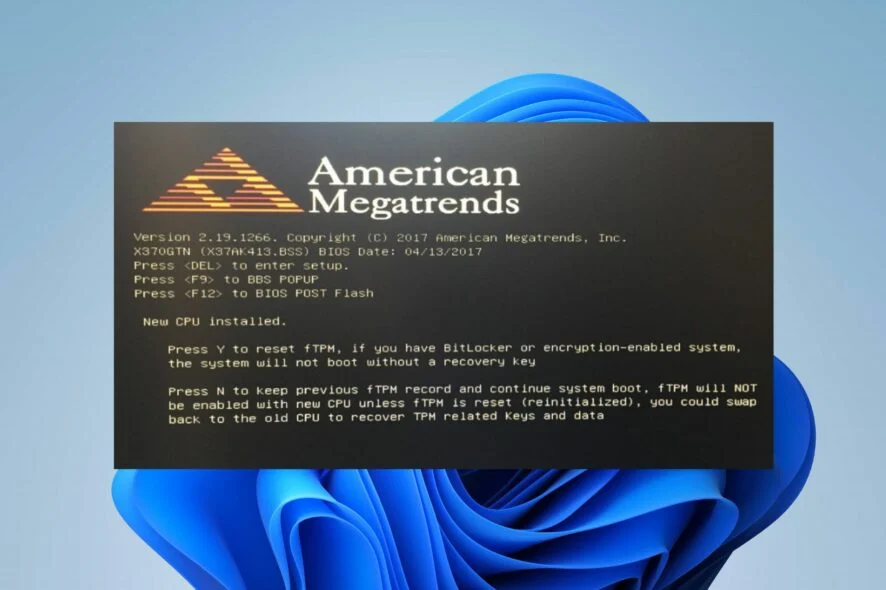
If Windows XP won’t boot after upgrading to a multi-core CPU, try disabling two cores in the BIOS. XP struggles with newer multi-core processors, and limiting it to two cores can help resolve booting issues and ensure smooth operation.
Fastest Intel CPUs With Motherboards That Will Still Run Windows XP?
The fastest Intel CPUs compatible with Windows XP are the Core 2 Quad series and early i3 processors. To ensure optimal performance, pair them with motherboards featuring XP driver support, like those with Intel 965 or P45 chipsets.
Windows XP Build: Code Name: The Last Samurai
For the Last Samurai Windows XP build, consider using an Intel Core 2 Duo or AMD Phenom II processor. Pair these with motherboards that support XP, like those with Intel 965 or P45 chipsets. This combination will provide a reliable and efficient system for running various XP-compatible applications.
What Is The Latest Intel CPU with XP Support?
The latest Intel CPU with Windows XP support is the Intel Core i3-530. While newer processors might work, they often need specific tweaks or drivers. The i3-530 provides good performance for XP and is one of the last fully supported options.
Xp On Newer Cpus, Instruction Set/CPU Feature Support List?
Running Windows XP on newer CPUs can be challenging since XP doesn’t support modern instruction sets like AVX and SSE4. It performs best with older CPUs that support older instruction sets, such as SSE2. Newer CPUs may need workarounds, limiting their features.
FAQ,s
1. Can I Still Use Windows XP In 2024?
Yes, you can use Windows XP in 2024, but it’s risky because it’s no longer secure. It’s better to upgrade to a newer version for safety and support.
2. Can Windows XP Support Quad Core Processors?
Yes, Windows XP can work with quad-core processors, but it won’t use all the power efficiently. For better performance, newer operating systems are recommended.
3. What Is the Minimum CPU for Windows XP?
The minimum CPU requirement for Windows XP is a 233 MHz processor. However, for better performance, a 300 MHz or faster CPU is recommended.
4. Can Windows XP Run On I7 Processor?
Yes, Windows XP can run on an Intel i7 processor. However, it won’t fully utilise the i7’s capabilities. For best performance, consider using a newer operating system.
5. Can I7 run Windows XP?
Yes, an Intel i7 can run Windows XP. However, it may not take full advantage of the i7’s power. For better performance and compatibility, using a newer operating system is recommended.
6. Is a Quad-Core Faster Than A Dual-Core Processor?
Yes, a quad-core processor is generally faster than a dual-core processor. It has four cores, allowing it to handle more tasks simultaneously, which improves performance, especially in multitasking and demanding applications.
7. How Many Cores Can Windows Support?
Windows XP supports up to 2 physical processor cores. However, newer versions of Windows, like Windows 10 or 11, can support many more cores, often in the hundreds.
8. How Can I Check If My CPU is Supported By Windows XP?
To check if your CPU works with Windows XP, make sure it’s at least 233 MHz. You can also visit the CPU maker’s website for more details.
9. Are There Any Alternatives To Windows XP For Unsupported Cpus?
To check if your CPU is supported by Windows XP:
- Check CPU Speed: Ensure your CPU is at least 233 MHz.
- Look for Compatibility: Visit the manufacturer’s website for your CPU to see if it mentions Windows XP support.
- Use System Information: Open System Information in Windows (type msinfo32 in the Run dialogue) to check your processor details.
10. Which CPU would Be Better For An “Ultimate” Windows XP Build, Core 2 Duo, Or Early I7 CPU? Or even an AMD CPU?
For an ultimate Windows XP build, an early i7 CPU would be better than a Core 2 Duo. It offers more power and efficiency. An AMD CPU, like the Phenom II, can also be good. Choose based on your specific needs and preferences.
11. What is compatible CPU for Windows XP?
Compatible CPUs for Windows XP include older models like Intel Core 2 Duo, Core i3, and AMD Athlon processors. At least 1 GB of RAM is required, but 2 GB offers better performance. Keep in mind that Windows XP is no longer supported.
12. How many CPU cores does Windows XP support?
Windows XP supports up to two physical CPUs in separate sockets and can handle up to 64 logical processors, including cores and threads on a single CPU. However, it doesn’t fully utilise modern multi-core or multi-threaded CPUs.
13. What is the minimum CPU for Windows XP?
The minimum CPU requirement for Windows XP is a 233 MHz processor, though a 300 MHz or higher processor is recommended for better performance. Compatible options include Intel Pentium or AMD Athlon processors with at least 64 MB of RAM.
14. What is the last Intel processor supported by Windows XP?
The last Intel processor fully supported by Windows XP is the Intel Core i7-2600 from the Sandy Bridge generation. While newer CPUs may function with XP, they require workarounds or custom drivers for proper operation.
Conclusion
Windows XP may be an aging operating system, but it still has life left, especially for older hardware and legacy software. Ensuring your CPU is supported by Windows XP is critical for performance and security. Whether you’re using an Intel, AMD, or VIA processor, knowing the right CPU compatibility can make all the difference.
Also Read
- Inventory Agent High CPU – Unveiling the Truth!
- CPU Machine Check Architecture Error Dump – Fixed 100% in 2024
- CPU Vdd Soc Current Optimization – Comprehensive Guide 2024
